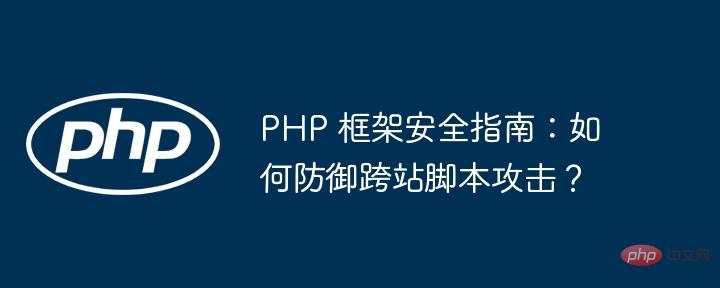
Prevent cross-site scripting attacks in PHP: escape user input, use htmlspecialchars(). Use parameterized queries to avoid SQL injection and XSS attacks. Enable CSP to limit script and content loading. Use CORS headers to restrict Ajax requests from different domains. In Laravel, use Input::get() and clean() for escaping and filtering.

PHP Framework Security Guide: Preventing Cross-Site Scripting Attacks
Cross-site scripting attack (XSS) is a serious web Security vulnerability that allows attackers to inject malicious scripts into web pages. This could result in sensitive information being stolen, pages being compromised, or malicious code being executed.
How to prevent XSS attacks in PHP
Here are some key steps to prevent XSS attacks using the PHP framework:
1. Escape user input
Escape any input from the user, including GET, POST, and cookie data. Use the htmlspecialchars() function to replace special characters to prevent the execution of harmful HTML or JavaScript code:
$input = htmlspecialchars($_POST['input']);
2. Use parameterized queries
in Use parameterized queries in database queries to prevent SQL injection attacks and XSS attacks:
$stmt = $conn->prepare("SELECT * FROM users WHERE username = ?");
$stmt->bind_param("s", $username);
$stmt->execute();3. Enable Content Security Policy (CSP)
CSP is a type of HTTP header, which allows you to limit the scripts and content that browsers can load from your site:
header("Content-Security-Policy: default-src 'self'; script-src 'self' 'nonce-yournoncehere'");4. Use cross-origin resource sharing (CORS) headers
For Ajax requests from different domains, use CORS headers to restrict access to sensitive API endpoints:
header("Access-Control-Allow-Origin: https://example.com");
header("Access-Control-Allow-Headers: Content-Type");5. Real-time case: Laravel
In Laravel, User input can be escaped using the Input::get() method:
$input = Input::get('input', ''); In addition, Laravel provides a helper function named clean(), It can perform basic XSS filtering on strings:
$input = clean($input);
Conclusion
Implementing these security measures is critical to protecting PHP web applications from XSS attacks. By following these best practices, you can help keep your users safe and maintain the integrity of your application.
The above is the detailed content of PHP framework security guide: How to defend against cross-site scripting attacks?. For more information, please follow other related articles on the PHP Chinese website!